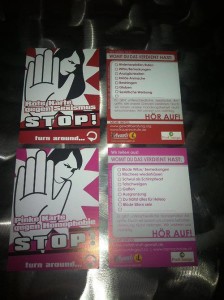I have been sexually harassed all my life but since I moved from a small village to a city (Stuttgart, Germany), it’s been getting worse. I am the girl-next-door-looking type. I never wear anything revealing.
I can hardly think of a day when I didn’t get any comments about my hair, my eyes, my ass, or whistles from a complete stranger. Some people even try to get really close to me, touch my arm or my hair until I tell them to knock it off and walk away. It only happens when I am alone or with a girl friend. I also had a stalker once who knocked on my window and my door several times and sent me a parcel with sex gadgets.
It makes me feel vulnerable. Like they own me and that they can say whatever they want.
It happens all the time, day and night, and I don’t know how to deal with it.
– CR
Location: Stuttgart, Germany
Share your street harassment story for the blog.
See the book 50 Stories about Stopping Street Harassers for more idea.


 Wir sind wütend, weil wir nicht sicher sind auf unseren Straßen, wie es uns einschränkt, uns unserer Freiheit beraubt. Nicht erst jetzt, nachdem seit der Silvesternacht ganz Deutschland auf einmal Sexismus, Street Harassment, sexuelle Belästigung entdeckt hat. Wir sind wütend, weil sexuelle Belästigung nicht erst Silvester erfunden wurde, sondern schon immer vorhanden war. Wir sind wütend darüber, dass nicht endlich eine Auseinandersetzung mit den allgegenwärtigen Sexismen in unserer Gesellschaft stattfindet.
Wir sind wütend, weil wir nicht sicher sind auf unseren Straßen, wie es uns einschränkt, uns unserer Freiheit beraubt. Nicht erst jetzt, nachdem seit der Silvesternacht ganz Deutschland auf einmal Sexismus, Street Harassment, sexuelle Belästigung entdeckt hat. Wir sind wütend, weil sexuelle Belästigung nicht erst Silvester erfunden wurde, sondern schon immer vorhanden war. Wir sind wütend darüber, dass nicht endlich eine Auseinandersetzung mit den allgegenwärtigen Sexismen in unserer Gesellschaft stattfindet. We are angry because we aren’t safe in our streets. We are angry about consequently being limited and about how our freedom is taken away. Not only now, that after New Year’s Eve the entire country – Germany – has discoverd sexism, street harrassment, sexual harassment. We are angry because all this was part of our lives already before New Year’s Eve. We are angy because no dispute regarding the omnipresent sexism in our society takes place.
We are angry because we aren’t safe in our streets. We are angry about consequently being limited and about how our freedom is taken away. Not only now, that after New Year’s Eve the entire country – Germany – has discoverd sexism, street harrassment, sexual harassment. We are angry because all this was part of our lives already before New Year’s Eve. We are angy because no dispute regarding the omnipresent sexism in our society takes place.
